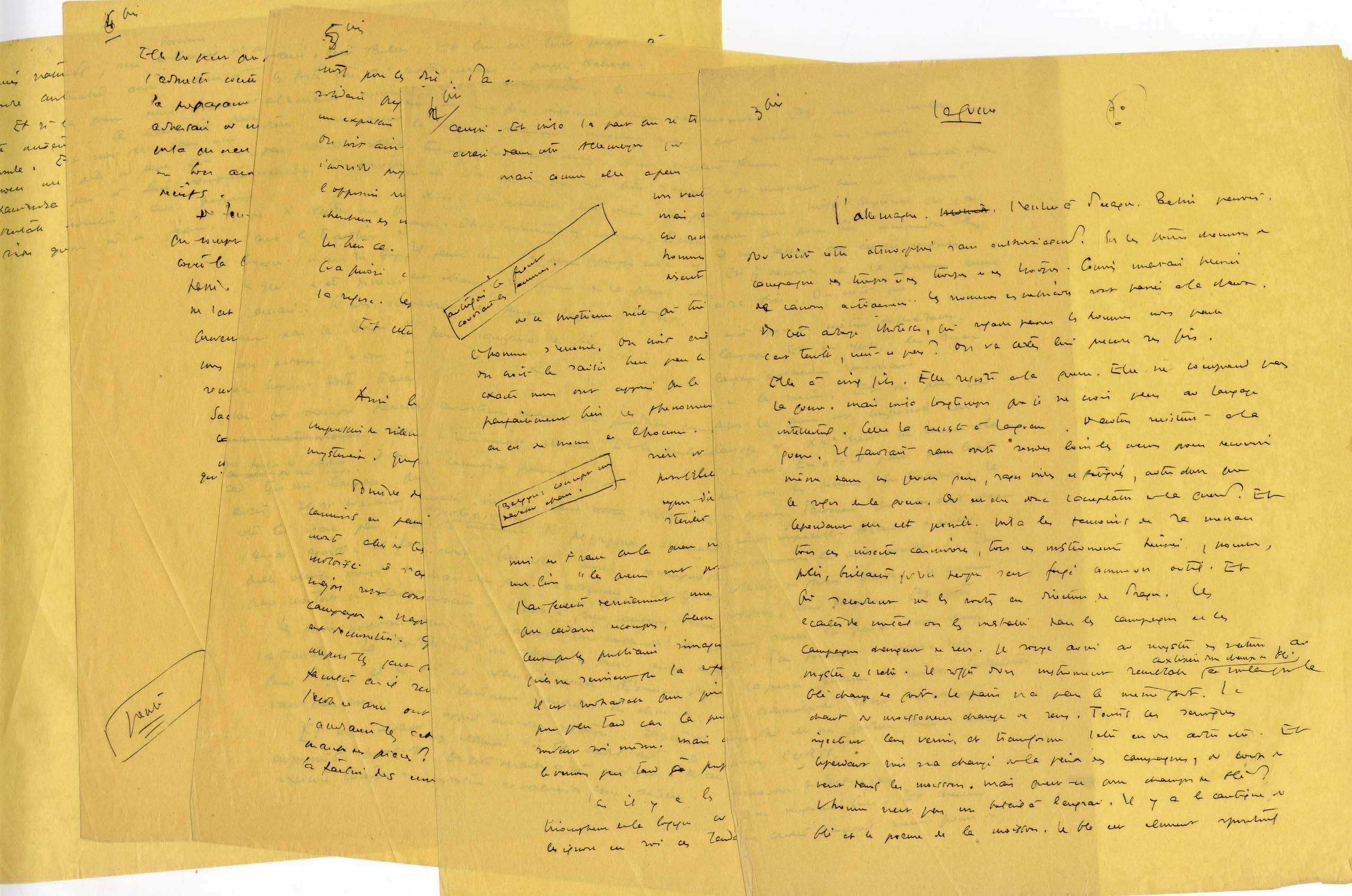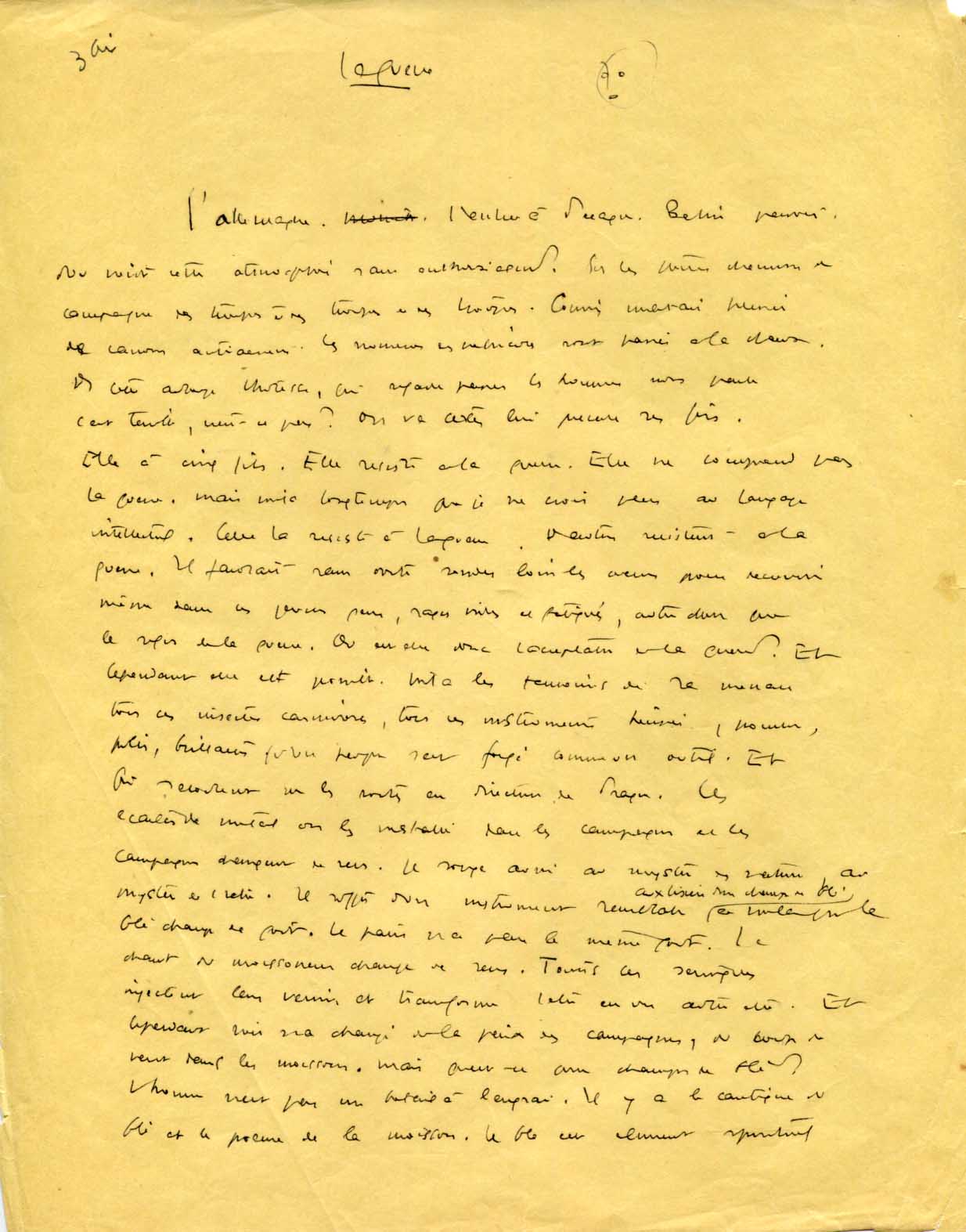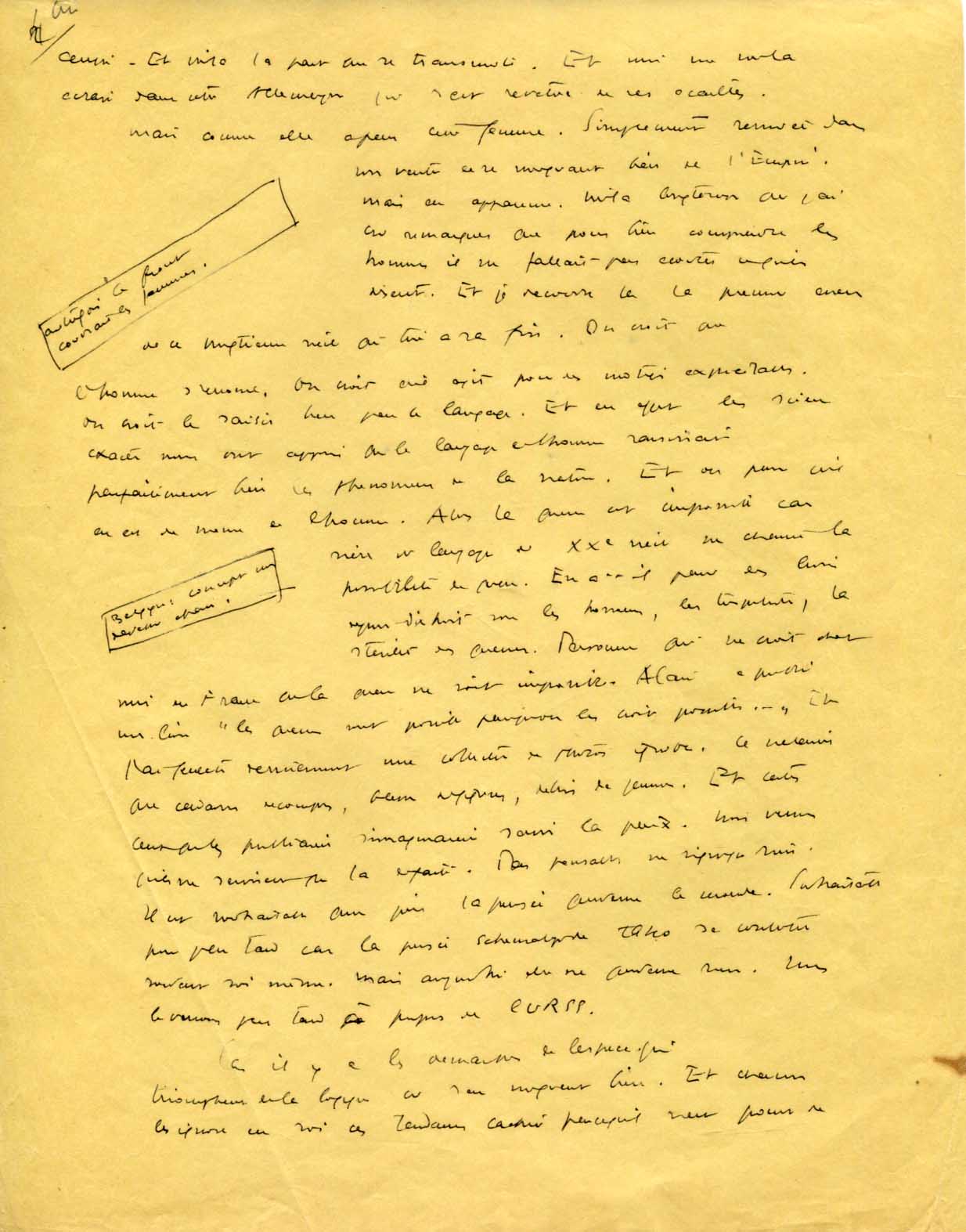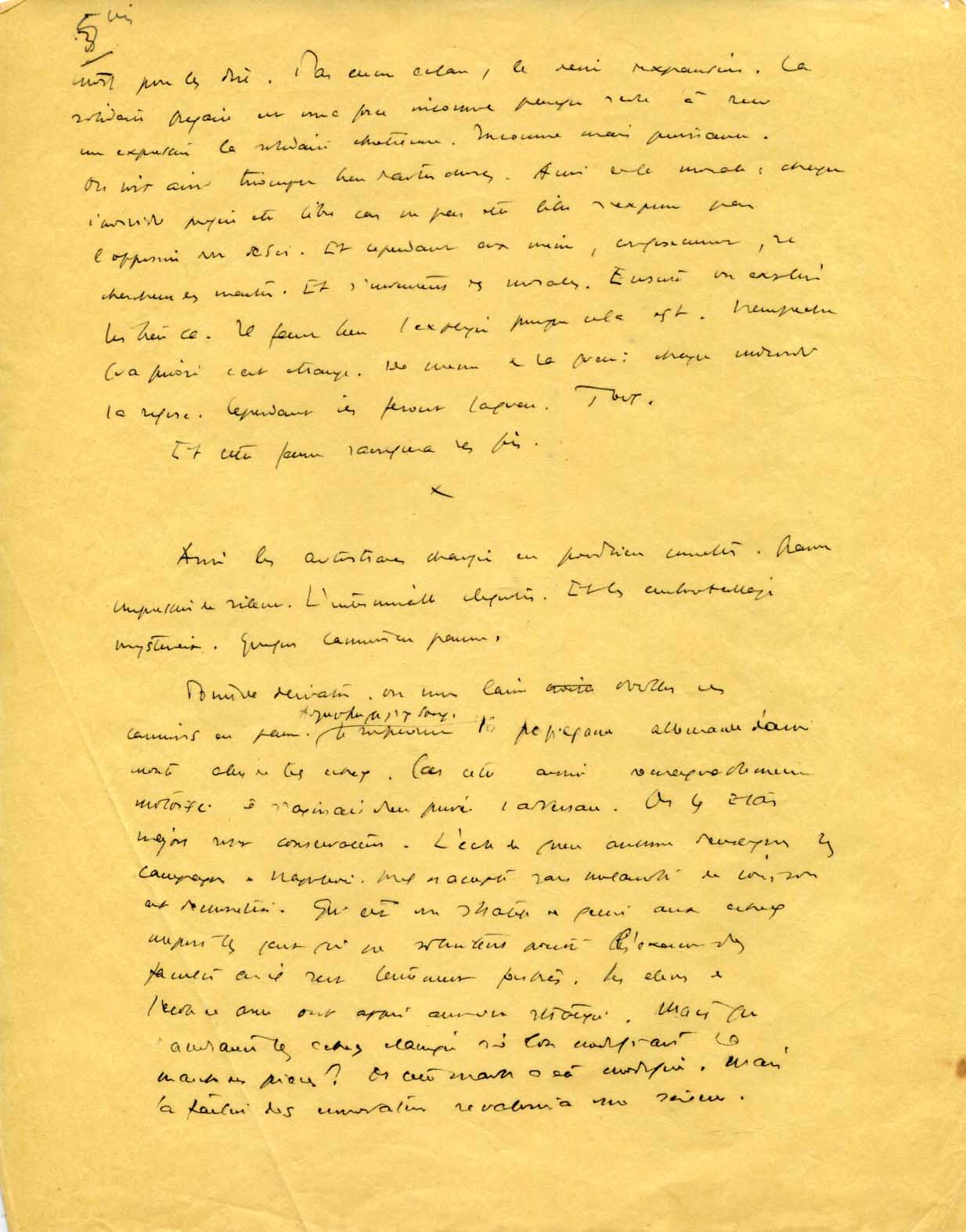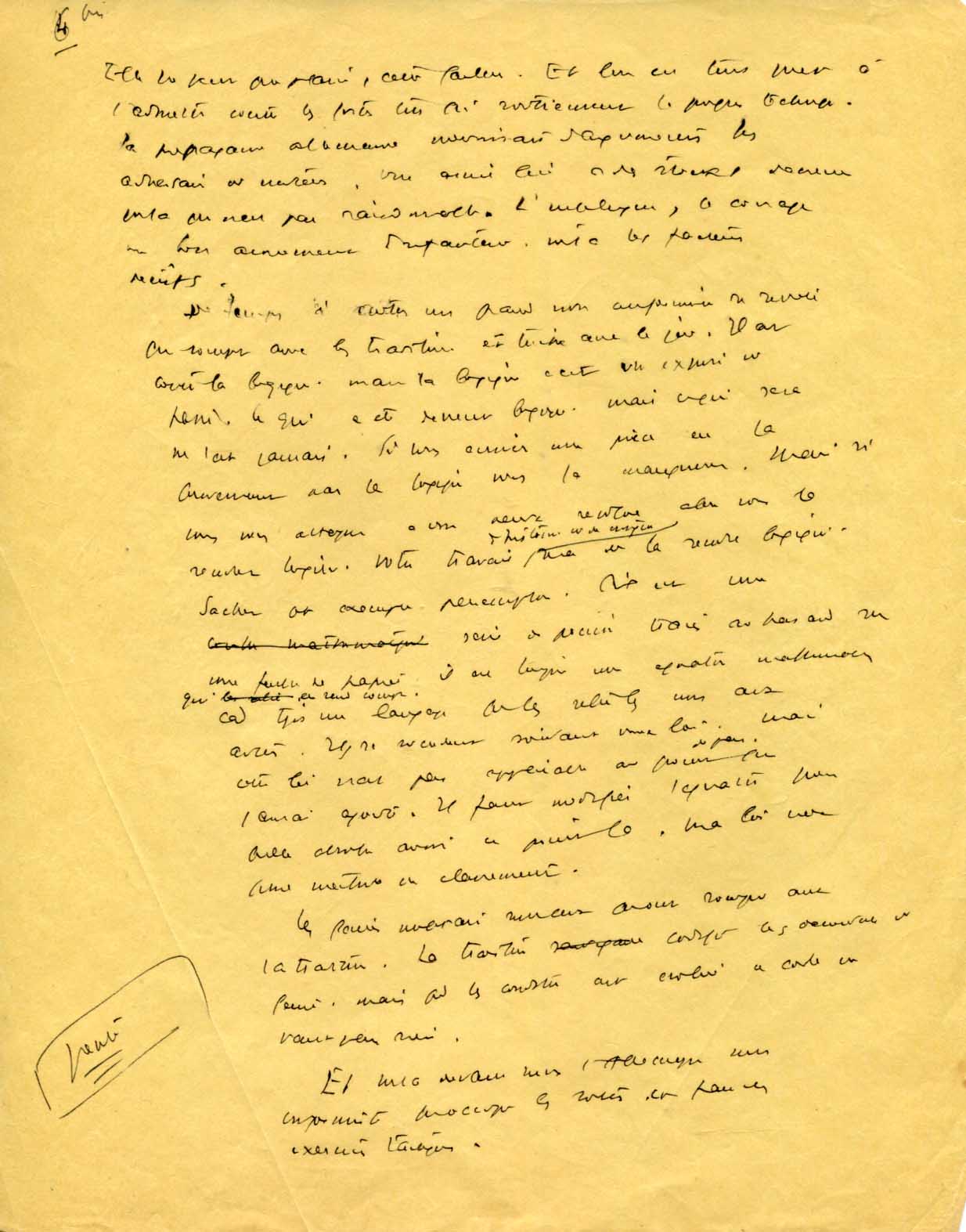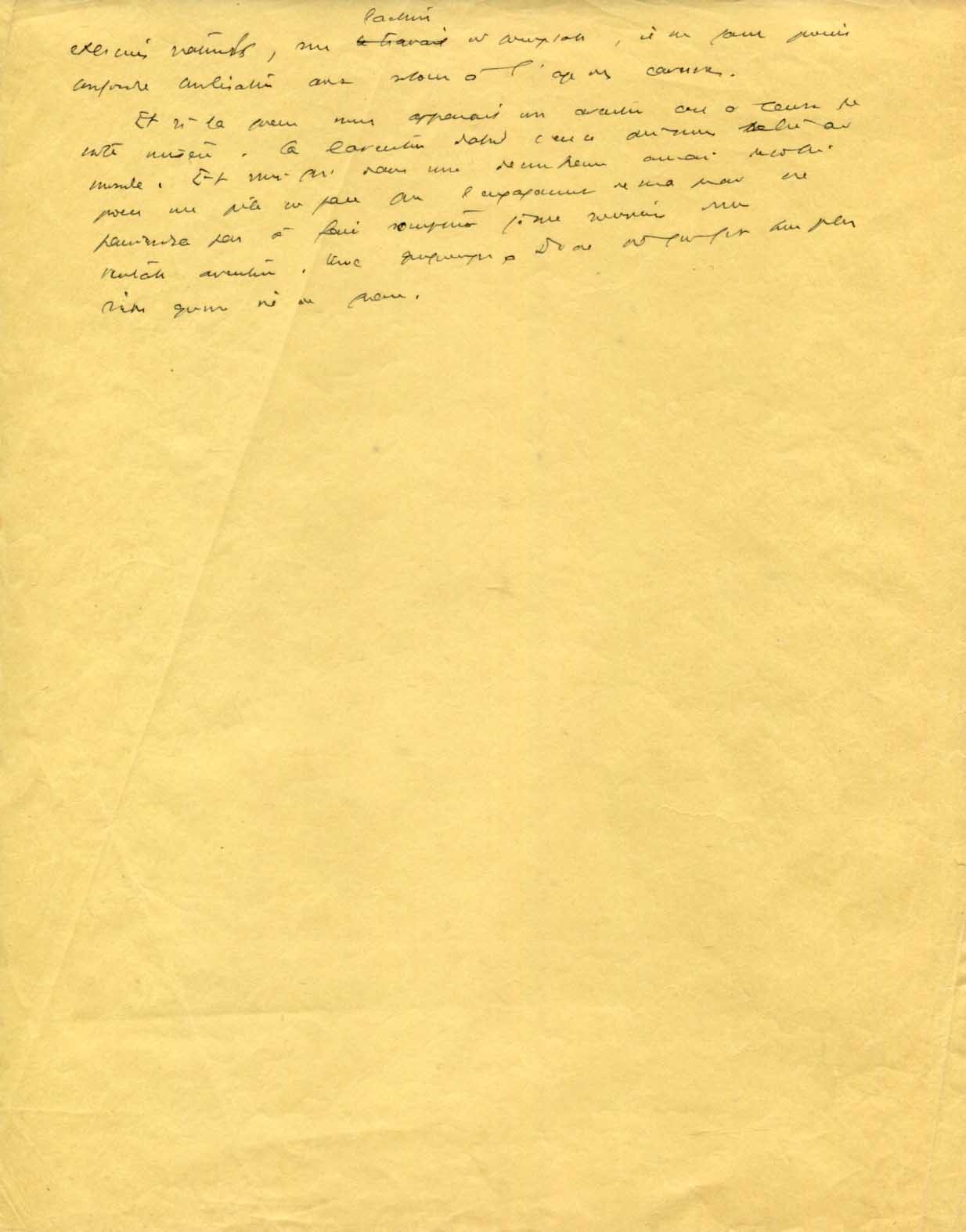Description
Autograph manuscript fragment with a small sketch of the face (at the top edge of the first page), 4 1/4 pages (carbonless paper), 8,25 x 10,5 inch, in French, manuscript on the inevitability of the war against expansionist Germany, after Hitler's invasion of Czechoslovakia (March 15, 1939)*, with erasures and corrections, written and drawn in black ink, with mild signs of wear to the edges - in fine condition.
In parts:
"L’Allemagne. L’entrée à Prague. […] d’où vient cette atmosphère sans enthousiasme ? Sur les petits chemins de campagne des troupes et des troupes et des troupes. […] Dans cette auberge l’hôtesse, qui regarde passer les hommes nous parle : c’est terrible, n’est-ce pas ? On va certes lui prendre ses fils. Elle a cinq fils. Elle résiste à la guerre. Elle ne comprend pas la guerre. Mais voilà longtemps que je ne crois plus au langage intellectuel. Celle-là résiste à la guerre. D’autres résistent à la guerre. Il faudrait sans doute sonder loin les cœurs pour découvrir même dans les jeunes gens, sages vides et fatigués, autre chose que le refus de la guerre. Où est-elle donc l’acceptation de la guerre ? Et cependant elle est possible. Voilà les témoins de la menace, tous ces insectes carnivores, tous ces instruments huilés [...] polis, brillants qu'un peuple s'est forgé comme un outil. Et qui s'écoulent vers les routes en direction de Prague. Les écailles de métal on les installe dans les campagnes et les campagnes changent de sens. Je songe aussi au mystère des natures, au mystère de l'être. Il suffit d'un instrument semblable aux lisières d'un champ de blé et voilà que le blé change de goût. Le pain n'a pas le même goût. Le chant du moissonneur change de sens. Toutes les seringues injectent leurs venins et transforment l'être en un autre être. Et cependant l'on n'a rien changé de la paix des campagnes, du coup de vent dans les moissons. Mais qu›estce qu'un champ de blé? L'homme n›est pas un bétail à l'engrais. Il y a le cantique du blé et le poème de la moisson. Le blé cet élément spirituel aussi. Et voilà la part qui se transmet. Et moi me voilà écrasé dans cette Allemagne qui s`est revêtue de ses éscailles.
Mais comme elle a peur cette femme. Simplement remuée dans son ventre et se moquant bien de l`Empire. Mais en apparence. Voilà longtemps que j`ai cru remarquer que pour bien comprendre les hommes il ne fallait pas écouter ce qu`ils disent [...] On croit que l`homme s`énonce. On croit qu`il agit pour des motifs explicables. On croit le saisir bien par le langage. Et en effet les sciences exactes nous ont appris que le langage de l`homme saisissait parfaitement bien les phénomènes de la nature. Et on pense qu`il en est de même de l`homme. Alors la guerre est impossible car rien du langage du XXe siècle ne chante la possibilité de guerre. En at-il paru des livres depuis dix-huit sur les horreurs, les turpitudes, la stérilité des guerres.
Personne qui ne crot chez moi en France que la guerre ne soit impossible. [...] il y a les demandes de l`espèce qui triomphent de la logique ou s`en moquent bien. Et chacun les ignore en soi ces tendances cachées parce qu`il n`est point de mots pour les dire. [...] Ainsi de la morale: chaque individu préfère être libre car ne pas être libre s`exprime par l`opposition d`un désir. Et cependant eux-mêmes, confusément, se cherchent des maîtres. Et s`inventent des morales. [...] De même de la guerre: chaque individu la refuse. Cependant ils feront la guerre. Tous. Elle ne peut que plaire, cette faillite. Et l`on est tous prêts à l`admettre contre les fortes têtes qui soutiennent le progrès technique. La propagande allemande nourrissait d`arguments les adversaires d`une armée qui a des stocks d`armes voilà qui n`est pas raisonnable. Le courage du bon armement d`infanterie, voilà les facteurs décrits. De temps à autres un grand non conformisme se révèle qui rompte avec les traditions et triche avec le jeu. Il est contre la logique mais la logique c`est un exploit du passé. C´est-à-dire toujours un langage qui les relie les uns aux autres. Ils se succèdent suivant une loi. Il faut modifier l`equation pour qu`elle absorbe aussi ce point-là. Ma loi n`est qu`une méthode de classement. Les génies sont ceux qui ont rompu avec la tradition. La tradition codifie les découvertes du génie. Mais quand les conditions ont évolué ce code ne vaut plus rien. Et voilà devand nous l`Allemagne non conformiste qui occupe les routes et fait des exercices tactiques. [...]"
Translated:
"Germany. Arrival in Prague. [...] where does this listless atmosphere come from? On the dirt roads troops and troops and troops. [...] In this tavern, the landlady, who sees the men walking by, speaks to us: It's terrible, isn't it? We will certainly take his sons from him. She has five sons. She opposes the war. She doesn't understand war. But I stopped believing in intellectual language a long time ago. This resists the war. Others oppose the war. It would probably be necessary to let hearts ring out far and wide in order to discover something other than refusal to war even in young people, wise, empty and tired. Where is the acceptance of war? And yet it is possible. Here are the witnesses of the threat, all these carnivorous insects, all these oiled, [...] polished, gleaming instruments that a people forged like tools. And which flow onto the streets towards Prague. The metal scales are installed in the landscape and the landscape changes direction. I also think of the mystery of nature, the mystery of being. It only takes an instrument like the edges of a wheat field and the wheat changes its taste. The bread doesn't taste the same. The song of the reaper changes its meaning. All syringes inject their venom, transforming the being into another being. And yet nothing has changed from the calm in the country, from the storm in the harvest. But what is a wheat field? Man does not fatten cattle. There is the Song of the Wheat and the Poem of the Harvest. Wheat this also spiritual element. And that's the part that gets carried over. And here I am, crushed in this Germany covered with its scales. But how scared this woman is. Just stir his stomach and make fun of the Empire. But in appearance. It's been a long time since I thought I noticed that to fully understand men one should not listen to what they say [...] We believe the man speaks. He is believed to be acting out of explainable motives. We think we understand it well through the language. And indeed, the exact sciences have taught us that human language perfectly captures the phenomena of nature. And we think the same goes for humans. So war is impossible because nothing in 20th-century language sings of the possibility of war. How many books have appeared in eighteen years about the horrors, the turmoil and the sterility of war.
Nobody in France believes me that war is impossible. [...] there are claims of the species that triumph over or ridicule logic. And everyone is unaware of these hidden tendencies within themselves because there are no words to express them. [...] So morality: Every human being would rather be free, because being unfree expresses itself through the opposite of a desire. And yet they themselves look confused for masters. And invent morals. [...] The same applies to war: every individual rejects it. However, they will go to war. All. It can only please, this bankruptcy. And we're all willing to admit it against the strong minds who support technological advances. German propaganda has fed the opponents of an army with arguments such as stockpiles of weapons, which is unreasonable. The courage of good infantry armament, these are the factors described. From time to time a great non-conformism reveals itself, breaking with tradition and cheating the game: it defies logic, but logic is a feat of the past. So always a language that connects them. They follow one another according to a law. We need to modify the equation to include this point as well. My law is just a classification method. Geniuses are those who have broken with tradition. Tradition codifies the discoveries of genius. But if the conditions have changed, this code is no longer worth anything. And here we have the maladjusted Germany occupying the streets and conducting tactical exercises. [...]"
* Saint-Exupéry had left at the beginning of March 1939 for a trip by car to Germany, which was quickly interrupted on the 15th by events. This text, perhaps conceived as a report, seems unpublished. A development on wheat is very similar to a paragraph in Pilote de guerre (Pléiade, II, p. 207).
Further Information on the person
Profession:
(1900-1944) French author & pioneering aviator - best remembered for `The Little Prince` & `Wind, Sand and Stars`.
Year of Birth: 1900
Certificate of authenticity
All of our pieces are sold with a Certificate of Authenticity. If a piece turns out to be wrong or if you do not like an autograph, you will get your money back for a lifetime.
Payment & Security
Your payment information is processed securely. We do not store credit card details nor have access to your credit card information.

